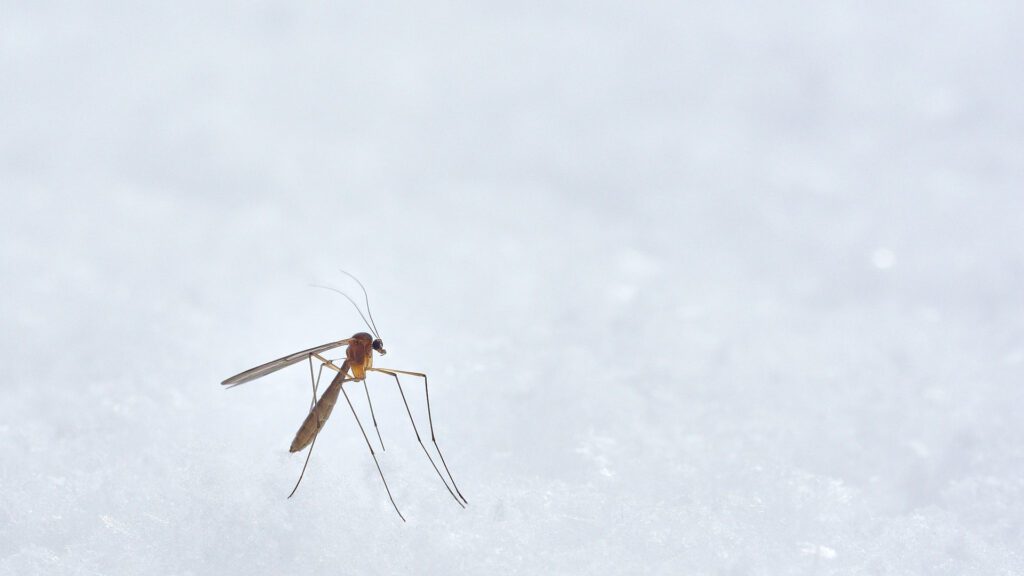Saving lives by managing disease-carrying mosquitos
Mosquitoes are the deadliest animal in the world. Across the globe, 3.5 billion people are at risk from the diseases they carry. And while the health and economic burdens are felt most keenly among the world’s poorest populations, the threat to us is no longer a distant one confined to world news reports or kept at bay through holiday vaccinations and tablets. Climate change, global trade and travel have brought the hazard right to our doorstep.

Dr Clare Strode, Reader in Vector Biology at Edge Hill University, is saving lives by helping to manage disease-carrying mosquitoes.
What began as a fascination with blood-sucking insects during her zoology and marine biology studies is now her vocation. She wants to further our understanding of these tiny insects and the impact they have on the planet.
Her work aims to support people in parts of the world where the risk of mosquito-borne disease is part of everyday life. And she is equally focused on preventing species of concern from getting a foothold in new territories and posing a threat to millions more of us.
Dr Strode’s pursuits are multi-faceted, from understanding mosquito resistance to insecticides to educating people in at-risk communities and helping to establish a UK-surveillance network.
The mosquito problem
There are more than 3000 mosquito species globally. They are pollinators and part of the food chain, feeding fish larvae, birds, bats, frogs, fish and other wildlife. But they also cause up to a million deaths every year.
Mosquitoes are vectors of malaria. This disease alone kills more than 600,000 people a year. Pregnant women and children under five in Africa face the most significant risk.
The insects are also responsible for spreading other deadly or life-changing diseases, including dengue, yellow fever, West Nile and Zika – a virus that hit pandemic levels in 2016. News coverage focused on the swathes of children suffering congenital disabilities after their mothers became infected during pregnancy.
The complexity of the mosquito’s physiology and the nature of the parasites and viruses they carry is proving challenging in developing vaccines.
The World Health Organization’s (WHO) approval of a malaria vaccine for children in October 2021 was a welcome advancement. However, the costs and logistics of rolling it out mean the positive impact will take time to show. Therefore, interventions to manage mosquitos remain vital in protecting against mosquito-borne disease.

The importance of insecticide treated bed nets
Insecticide-treated bed nets (ITNs) have long been a tool in the armoury of malaria prevention. Since 2004, two million ITNs have been distributed, saving more than seven million lives and preventing more than one billion malaria cases.
However, there have been recent concerns over their effectiveness after several field trials showed a lack of consensus in their results. Dr Strode endeavoured to explore the issue further. And to date, this is the work she is most proud of.
Funded by Roll Back Malaria, she carried out a meta-analysis of 60 ITN trials against insecticide susceptible and resistant malaria vectors in Africa dating back to 1980.
She concluded that ITNs remain more effective than untreated bed nets against resistant malaria vectors and therefore should remain a core intervention while innovative vector control tools are developed.
Dr Strode’s study has had a significant ‘real world’ impact. It has informed key WHO policy and its Global Malaria Programme to guide national planning and response. Charities and not-for-profit organisations have also used it as evidence that in continuing to buy ITNs, they are using precious donors’ money wisely.
Her research also highlighted the need for greater consistency in how ITN field trials are conducted and reported. This would allow them to be compared and evaluated more easily.

Understanding insecticide resistance
To keep mosquito-borne diseases under control, the WHO also recommends insecticide and larvicide spraying in key breeding areas. But mosquitoes’ resistance to these sprays can impact their effectiveness.
Another core pillar of Dr Strode’s work has been looking at mosquitoes’ genetics to understand their resistance to insecticides. This means that new tools and strategies can be developed to manage them more effectively.
Her study findings have informed malaria control programmes in southern Africa, where similarities in resistance across provinces have led to the development of local management plans. This contrasts with traditional country-wide ones.
This localised approach was also crucial to Dr Strode’s work in Colombia – a collaboration between Edge Hill University and the Universidad de Antioquia.
The team surveilled Ae. aegypti (dengue and Zika vector) mosquitoes, and undertook insecticide monitoring in 10 endemic cities at the height of the Zika global health emergency in 2016. Based on their findings, local health authorities could make informed choices about the use of insecticides in their area and what public health campaigns may be necessary.
As a day-biting mosquito, Ae.aegypti have adapted to living close to humans and are hard to control. Dr Strode took part in house-to-house visits collecting samples and offering advice on reducing breeding sites, such as regularly cleaning or removing stagnant water sources.
Dr Strode has also taken a global outlook in this area, studying common gene patterns in Ae. aegypti in countries worldwide to better understand resistance and track its spread.
Ensuring the UK is prepared
The UK is currently home to 34 species of mosquito. They may irritate us with the odd bite, but we generally don’t consider them much more than a nuisance.
However, disease-carrying mosquitos have already established themselves on our doorstep in European countries such as France, Spain, Italy and Austria.
This is down to several factors. Climate change has created favourable conditions for disease-carrying mosquitoes to thrive beyond the tropics and sub-tropics. Extensive travel and trade are also eroding natural barriers.
There have been repeated introductions of Ae. albopictus (arbovirus vectors) in Kent and an isolated case of Ae. aegypti (dengue and Zika vector) in Merseyside. Therefore, another vital strand of Dr Strode’s work is preventing disease-carrying mosquitoes from becoming established species in the UK and posing a major health risk.
With her research team, she has:
- Developed a low-cost method to screen imported used tyres for the eggs of invasive mosquito species, removing them for analysis with non-toxic adhesive tape.
- Partnered with the UK Health Security Agency (formerly Public Health England) to establish a UK-wide surveillance network of 57 sites, including seaports, airports and distribution centres.
- Led surveillance training for environmental health and port health officers across the country, including introducing rapid PCR tests for samples.
- Prompted the government to develop a National Contingency Plan for Invasive Mosquitoes following a co-produced article with the UK Health Security Agency detailing the discovery of Ae. aegypti.
Keeping up momentum
Dr Strode remains thankful to Edge Hill – most notably Head of Biology, Professor Paul Ashton – for supporting her on her journey and providing all the necessary infrastructure such as molecular facilities and insectaries. She is now keen to advance projects she is already leading and supporting.
Dr Strode is seeking grant funding to advance the UK surveillance work. She is also continuing to work with Colombian colleagues on the gene patterns of insecticide-resistant mosquitoes so strategies to manage them can be adapted and kept up to date.
Additionally, she is collaborating with colleagues at Lancaster University, the Centre of Disease Control in the USA, the Democratic Republic of Congo and Ethiopia on a satellite-based surveillance system. It looks at climate and land use to support mosquito risk mapping even down to the level of individual buildings so limited resources can be targeted for the biggest impact.
Our research means that
- Those most at risk from mosquitoes – the world’s deadliest animal – are given a voice, and their plight continues to be highlighted.
- The World Health Organisation, charities, not-for-profit organisations and public health teams have the latest scientific evidence to guide policies and interventions to manage mosquitoes effectively.
- People in the UK don’t currently face an everyday risk from disease-carrying mosquitoes, thanks to surveillance, testing and contingency plans.
Find out more about Clare Strode’s research by viewing their profile on Pure:
Dr Clare Strode’s research